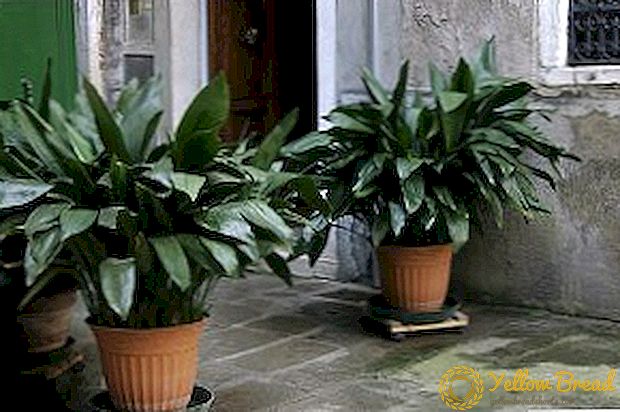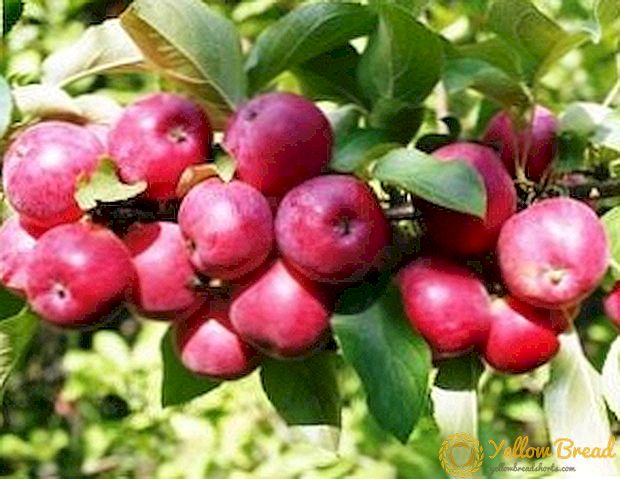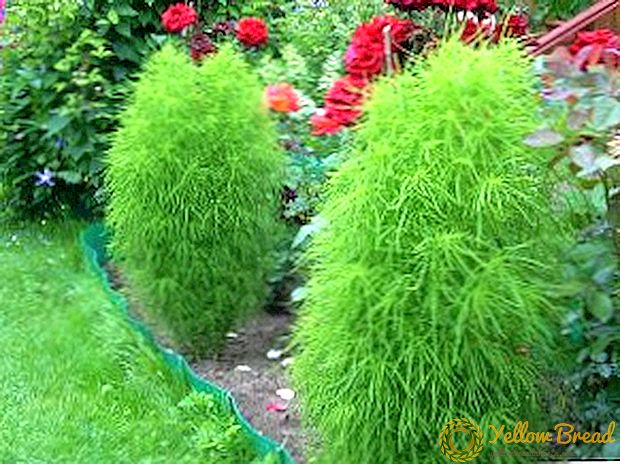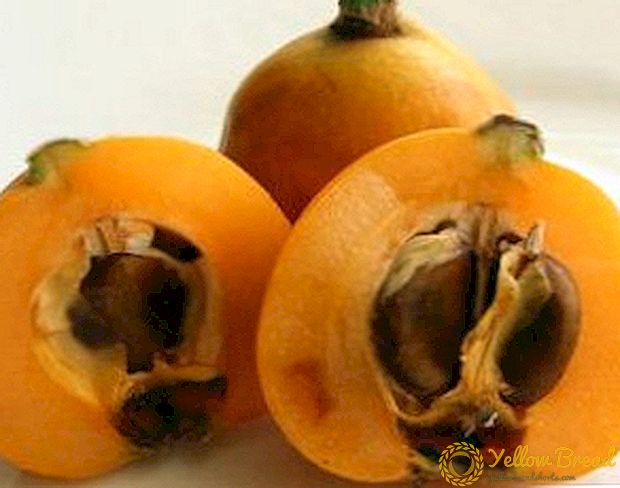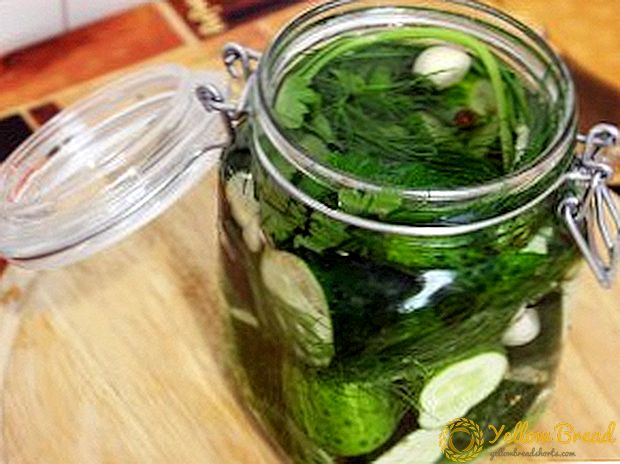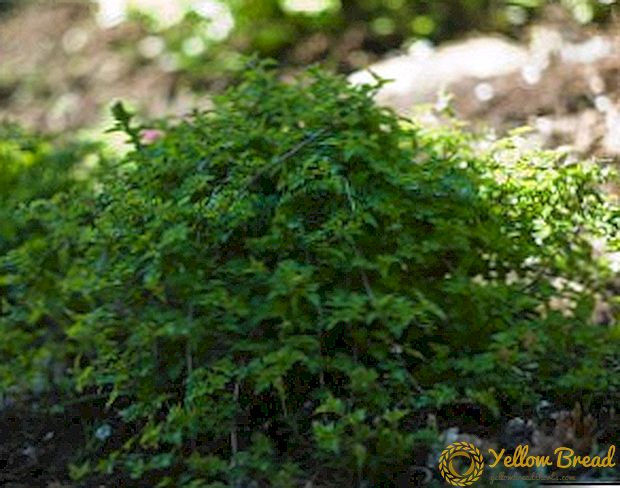
Any person who enjoys gardening is trying to increase the number of crops that "live" on his land.
Thus, interest in fruit trees is steadily increasing.
Now, almost at every site grow different varieties of apple trees, plums, pears, cherries and other fruit and berry crops.
With the development of modern methods of development and protection of the garden, growing new types of trees has become much easier than before.
Therefore, the most fastidious plant varieties coexist in our temperate climate.
Pears, in particular the variety “In memory of Yakovlev”, are among such capricious plant species.
Description of the variety
For this type of pears, the Tyoma and the French variety Olivier de Serres were crossed.
Tree short, growing rapidly, the crown is rounded. Shoots of brown light, medium thickness, thorny. The leaves have the shape of an ellipse, bright green, slightly folded. Fruits are medium sized, typical pear-shaped, skin is glossy, yellow. The flesh is cream-colored, juicy, very sweet. Productivity is high. The tree begins to bear fruit at 3 - 4 years of growth. Well withstands transportation and frost.
Quality and quantity of the crop varies depending on the degree of soil moisture, so this variety is particularly necessary regular watering. Variety "In memory of Yakovlev" resistant to scab. Self-fertile.
Merits
- quickly begins to bear fruit
- exclusive taste of pears
frost resistance
resistant to scab
disadvantages
- low drought resistance
Features planting pears

Planted variety "in memory of Yakovlev" preferably in springto make trees better settled. Before planting, the roots of the seedlings need to be seen well, put into the water for a couple of days. On the site you need to choose a place with sufficient lighting and well hydrated. Under the seedling you need to dig a hole 1 m deep and 75 - 90 cm in diameter. The top layer of soil of 30 cm must be put aside, since it is from this earth that a mound must be formed at the bottom of the pit.
This soil should be mixed in 2 kg of humus or manure, 50 g of superphosphate and 30 g of potassium chloride. On the formed mound, it is necessary to distribute the roots, cover the remaining space of the pit with earth so that the root neck rises 4 to 5 cm from the general soil level. The ground should be slightly compacted, watered and covered with organic mulch.
Care
1) Watering
The variety "In memory of Yakovlev" has a low drought resistance, therefore, it is especially important to water both saplings and mature trees well. Young trees need to dig a circular trench at a distance of 30-40 cm from the tree and pour 2 buckets of water into it. In the case of mature trees, such grooves should be 3 - 4. The latter should be wider than the projection of the crown by about 15 - 20 cm. Watering should start in the middle of spring, and finish in the middle of autumn.
2) Mulching
The purpose of mulching is to feed and protect the roots of the tree from the cold. Mulch can be peat, ash, sawdust, old leaves, mowed grass, Batwa plants. The first mulching is carried out during planting, and then regularly during the active period of the tree’s life.
3) Harboring
This pear variety is frost resistant, but protection from the cold must be ensured. Before the frost starts, the pears should be wrapped with white material that will protect the trunk from frost and rodents. As such material you can use fabric, paper, polyethylene or special materials. It is also possible to pour water near the frost before the frost, which will freeze as a result. Ice crust will protect the roots from the cold.You can still use snow, but under the condition, but there has not yet been a strong frost.
4) Pruning
The formation of a crown in trees whose age has reached two years is a very important procedure. Sometimes it happens that a tree grows tall, but does not bear fruit. To do this, from an early age, you need to cut the center conductor of the tree above the bud approximately 60 cm above the ground. So, for the next season, the side branches will appear. Further, the central shoot and new side branches should be shortened by about a quarter, also above the buds.
Already in an adult tree you need to shorten all branches of the crown so that the foliage takes the correct shape. Pruning of trees should be carried out in the spring, and cuts covered with special paints or solutions.

5) Fertilizer
Fertilize the soil to fall 2 years after planting. It is necessary to bring additional dressing into the grooves for watering or to a depth of at least 50 cm. Phosphorus and potash fertilizers are simply necessary for the pears. These types of fertilizers should be mixed with organic matter and applied to the soil every 5 years. Nitrogen is necessary for pears for active growth, therefore this type of top dressing needs to be brought during active flowering of trees and at the first loosening of the earth in spring.Organics can be made every 2 years. there is still foliar planting trees. During these procedures, maids are treated with a nutrient solution to increase growth rate and improve yield. In this case, trees can be sprayed with a solution of sulfate or potassium nitrate (1–2%) and a solution of superphosphate (2–3%).
6) Protection
This variety is almost not damaged by scab, but as a prevention, you can use a solution of urea (5%), which is treated with trees immediately after the end of fruiting.

